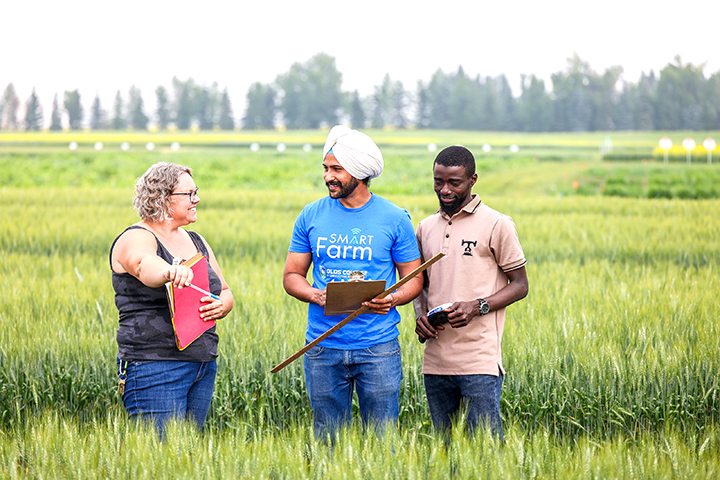Current Temperature
-13.6°C
BioScout: Making a difference for crops locally and abroad
Posted on October 17, 2024 by Taber Times Smart Farm Photo Shoot for Olds College. Photo Credit: Sergei Belski
Smart Farm Photo Shoot for Olds College. Photo Credit: Sergei BelskiBy Nerissa McNaughton
Southern Alberta Newspapers
In a world where the population continues to swell, reaching nearly 10 billion by 2050, the pressure is on to find innovative solutions in agriculture to combat global hunger. The Food and Agriculture Organization of the United Nations projects that food production must increase by 70 per cent to meet this demand. As we face limited resources and changing climates, technological advancements in crop research are more crucial than ever.
Olds College’s Smart Farm is answering the call.
The Olds College Smart Farm spans 3,600 acres dedicated to crop and forage production, equipped with cutting-edge technology and machinery. It features a 1,000-head capacity feedlot, a commercial cow/calf herd, a Purebred Red Angus herd, and a flock of sheep. Additionally, the Smart Farm benefits from access to greenhouses, laboratories, incubator space, a brewery, and the National Meat Training Centre, along with other facilities at Olds College of Agriculture & Technology.
A standout collaboration is their partnership with BioScout. Christina Kaye, Project Lead, Smart Agriculture Applied Research, Olds College Centre for Innovation, provides some insight into this partnership.
“At Olds College, we are currently working with BioScout, an Australian-based company that has developed a device that collects, identifies, and quantifies disease spores. In collaborating with the Pan-Canadian Smart Farm Network, there are two devices deployed at Olds College. This multi-year project involves the collection of data for the development of disease risk models based on spore loads for diseases that are of concern in Western Canada, such as sclerotinia stem rot in canola. In addition to deploying the sensors, Olds College is providing BioScout with boots on the ground data, for the purpose of ground truthing their beta algorithms. Devices like the BioScout unit will provide producers with more accurate data and allow better on-farm fungicide application decisions.”
BioScout’s technology is revolutionizing how farmers manage crop diseases. By providing real-time data on spore loads, this device empowers producers to make informed decisions about fungicide applications, reducing unnecessary spraying and promoting sustainable practices. The collaboration with Olds College is crucial for refining BioScout’s algorithms, ensuring the technology is adapted to Canadian agricultural conditions.
The impact of BioScout extends beyond Canada, offering hope into a future where precision agriculture can help meet global food demands efficiently and sustainably.
Learn more about this and other Smart Farm projects by visiting https://www.oldscollege.ca/smart-farm-research.
Leave a Reply
You must be logged in to post a comment.

